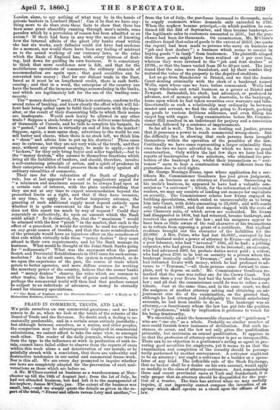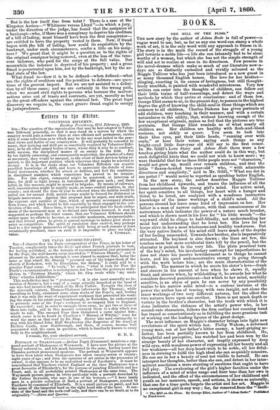FRAUD IN COMMERCE, TRUSTS, AND LAW.
Wis pride ourselves on our commercial greatness ; and we have reason to do so, when we look at the totals of the returns of the Board of Trade and the Revenue. No doubt such a feeling is oc- casionally pardonable, and in a certain sense entirely justifiable ; but although between ourselves, as a nation, and other peoples, the comparison may be advantageously displayed in commercial calculations, we cannot afford to take the same view, as amongst each other. The reader of the daily journals, whose eye travels from the type to the influences at work in production of such to- tals, cannot have failed either to observe from the reports of eases within this week alone a sad deterioration of our morals, or be painfully struck with a conviction, that there are unhealthy and destructive tendencies in our social and commercial frame-work. Nor is this all. We are every day prompted to inquire whether our laws are completely adapted for the prevention of such mal- versations as those which are before us.
A Mr. M'Clure carried on business as a warehouseman at Man- chester up till the 18th of August last; from the 1st of July, he had not attended business, but had left it to the management of his nephew, James M'Clure, jun. The extent of the business was small, but,--and we simply quote the details as given in the re- port of the trial, "Fraser and others versus Levy and another,"— from the 1st of July, the purchases increased to thousands, made to supply customers whose demands only extended to 2791.
When the nephew became principal,—in which position he con- tinued till the 23d of September, and then became bankrupt,—
the legitimate sales to customers amounted to 3331., but the pur- chases had been for thousands. On examination, Mr. M'Clure's creditors found that sales of goods to the extent of 29331. (we quote the report) had been made to persons who carry on business as "job and fent dealers" ; a business which seems to consist in buying goods "in lull*" from tradesmen. The plaintiffs alleged
that these goods might have been realized at 5 per cent loss, whereas they were invoiced to the "job and tent dealers" at 19701., so that the losses varied from 20 to 50 per cent. The jury found that the sales were fraudulent, and by their verdict they restored the value of the property to the deprived creditors. Let us go from Manchester to Bristol, and we find the Assize Court dealing criminally with the clerk of a bankrupt named Wells, upon whose case we have before commented. Wells had a large wholesale and retail business as a grocer at Bristol and Newport. Batterahill, his clerk, had advanced, or professed to advance, out of moneys acquired in Australia, to the bankrupt, loans upon which he had taken securities over warrants and. bills. Questionable as such a relationship may ordinarily be between
master and servant, we find the clerk going to Newport, packing up goods to various fictitious addresses, and even filling his carpet bag with sugar. Long examinations before Mr. Commis- sioner Hill resulted in an indictment for perjury and a convicticn resulted, followed by a sentence of imprisonment. So far all is well. The law, in so dealing out justice, proves that it possesses a power to reach commercial wrong-doers. But the difficulty lies in showing that such persons have brought themselves within the operation of the penalties of the law. Continually we have cases representing a larger criminality than even the two we have adverted to, for which we have no penal counteraction. Only within the last few days we have had the reports of bankruptcies of two solicitors, who obtained the pro- tection of the bankrupt law, whilst their transactions as " scri- veners " seem to bear a construction widely different from the protection due to civil rights.
Mr. George Montagu Evans, upon whose application for a cer- tificate Mr. Commissioner Goulburn has just given judgment, carried on business as an attorney at Farnham. Succeeding to his uncle's business, he appeared to have had a valuable con- nexion as " a scrivener" ; which; for the information of unlearned readers, we may say consists of lending out moneys for capitalists on security. The Commissioner relates how Evans engaged in building speculations' which ended so unsuccessfully as to bring him into Court, with debts amounting to 33,000/., and with assets only valued at 1500/., and that amount clogged with the costs of nine Chancery suits, of which seven are undecided. Mr. Evans had disappeared in 1858, but had returned, become bankrupt, and received the protection of the law ; and his assignees appear to have been so little aware of the real character of his transactions as to refrain from opposing a grant of a certificate. But vigilant creditors brought out the character of the liabilities for the 33,000/. A Mrs. Paine, who had lost 16,0001., conveyed by her dying husband under a power of attorney to Evans—an attorney ; a poor labourer, who had " invested " 1981, all he had ; a jobbing carpenter, who had given Evans 240/. to be invested ; an executor, who had advanced 490/. for probate duties never paid ; a widow, who had given 2701. to be lent on security to a person whom the bankrupt ironically called " Trueman; ' and a tradesman, who had intrusted Evans with money, which he had professed to ad- vance to " Trueman,"—all these persons came forward to com- plain and to depose on oath ! Mr. Commissioner Goulbium re- marked that the case was rather one for the Crown Court. Yet for more than a year Evans had had the benefit of the bankrupt law; and all that the commissioner could do was to refuse a cer- tificate. Just at the same time, and in the same court, we find the assignees of another attorney asking and obtaining an ad- journment sine die of the examination, on the ground that, although he had attempted indefatigably to furnish satisfactory accounts, he had been unable to do so. The bankrupt was an attorney,—a functionary whom the law has put into the position of a "gentleman," while by implication it professes to vouch for his being trustworthy. We cheerfully admit the honourable character of " gentlemen " who are "one etc." as a whole. Probably no similar number of men could furnish fewer instances of defalcation. But such in- stances do occur, and the law not only gives the qualification primarily, but maintains an annual qualification. It appears to us that the profession of attorney-scrivener is per se irresponsible. There can be no objection to a gentleman's acting as agent in pro- curing good securities for employers, yet it seems to us that the examination and completion of the security should be peremp-
torily performed by another conveyancer. A scrivener ought not to be an attorney ; nor ought a scrivener be a builder or a specu- lator of any kind. The inflexible rule of the Stock Exchange, that no broker shall be a dealer on his own account, would apply as usefully to the class of attorney-scriveners. And, remembering these and recent provincial cases at York and Sunderland, it is only proper that an attorney should be disqualified for the posi- tion of a trustee. The time has arrived when we may usefully inquire, if our ingenuity cannot compass the invention of an agency which shall operate as a cheek upon the officers of the law. But is the law itself free from taint ? There is a case at the Kingston Assizes—" Whitmore versus Lloyd "—in which a jury, under the direction of the judge, has found that the assignees of a bankrupt—who, if there was a conspiracy to deprive his creditors of a bill of lading, must himself have been the first conspirator— are entitled to have the property 'vested in them. Now, if fraud began with the bill of lading, how could its acquisition by the bankrupt, under such circumstances, confer a title on his assig- nees? We grant that it might be a question as to the rights of the original consignor being restored, even at the loss of the inno- cent indorsee, who paid for the cargo at the full value. But meanwhile the indorsee is deprived of his property ; and a gross fraud is perpetrated upon him, not by the bankrupt, but by the ac- tual state of the law.
• What fraud is—how it is to be defined—when defined—what are the rights of creditors and the penalties to debtors—are ques- tions of the gravest import. But we are not assisted to a defini- tion by all these cases ; and we are certainly in the wrong path, when we accord civil rights to persons who because the malver- sations arise out of trusts and contracts, are yet, morally as bad as the great offenders against the criminal law. The great legal discovery we require is, the exact groove fraud ought to occupy in jurisprudence.



























 Previous page
Previous page